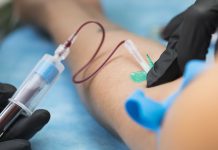Richard Francis, Head of Research at the Stroke Association, identifies the priority areas for research investment that will make the greatest difference to stroke survivors
Stroke is a leading cause of adult disability and the fourth biggest killer in the UK (1). Whilst stroke mortality (age-standardised) has almost halved, the incidence and prevalence of stroke is rising. There are 1.3 million stroke survivors in the UK (2), and this figure is set to increase to over 2 million, by 2035 (3). The reduced mortality rate for stroke is worth celebrating – there are hundreds of thousands of people in the UK who wouldn’t be here today if it weren’t for the leaps and bounds in our understanding of acute treatment for stroke.
The Stroke Association is an example of an organisation that has played a crucial role in supporting stroke research in the UK and has been involved with major breakthroughs in treatment and care. This includes thrombolysis and thrombectomy which radically improve outcomes for ischaemic stroke.
However, the improvements that we have seen in acute stroke treatment have not been replicated in rehabilitation and community care. With more stroke survivors surviving and living with the long-term effects of stroke – almost two-thirds of stroke survivors leave hospital with a disability (2), two-thirds of stroke survivors have problems with their speech and communication and four in ten experience depression and/or anxiety (4), we need to ensure that equivalent advances are seen across the stroke pathway.
Despite the huge impact of stroke, the picture we see now for research is bleak, just 1.2% of UK public and charity health research spend is on stroke (5). Given the urgent need for innovation in stroke care and the lack of funds for stroke research, our charity is calling for an increase in stroke research funding and for these limited funds to be invested in the areas that will most change stroke survivors’ lives. We need to be in a position where we can support the growing numbers of stroke survivors, who are living with the life-changing effects of stroke.
Our charity, the Stroke Association has announced the areas future research must focus on to improve stroke care. The announcement of these research priorities, which have been set by stroke survivors, carers and professionals, marks the first UK-wide project spanning the entire stroke care pathway. The findings are being shared in the charity’s new report “Shaping stroke research to rebuild lives: The Stroke Priority Setting Partnership results for investment.”
The priorities were established in the Stroke Priority Setting Partnership (Stroke PSP) using the well-established James Lind Alliance process to ensure credible, patient-centric outputs (6). The findings provide a road map to direct the activities of funding bodies, researchers and decision-makers investing in stroke research.
The Stroke PSP produced two priority lists of 10 uncertainties, ranked in order of importance – the first on prevention, pre-hospital and hospital care, the second in rehabilitation and long-term care. These lists reflect the diverse and complex field of stroke and the opportunities for innovation in research. The number one priorities are primary prevention of stroke, and diagnosis, prevention and treatment of the psychological impacts of stroke.
Establishing these research priorities is a huge first step, however, challenges lie ahead. The COVID-19 pandemic has reduced the already limited funds for stroke research and has delayed progress for some ongoing trials (7). Furthermore, in the UK, we now have increased pressure on our already over-stretched health and social care system, with a workforce who must also cope with significant disruption (8-9).
We’re calling for significantly increased investment in stroke research to close the gaps in treatment and care for stroke survivors and their carers. Investing in the priority research areas established by the Stroke PSP will ensure that research makes the biggest difference to the lives of people affected by stroke and reduce the cost of stroke to society.
It’s projected that investing £10 million into stroke cognitive rehabilitation research, a top priority identified in the Stroke PSP, will save over 71 times the amount invested over 20 years (10). Stroke costs the NHS and social care services £8.6 billion per year (11) so significant investment in stroke research and resulting interventions will save both lives and money.
Our thanks go to everyone who has contributed to the Stroke PSP, in particular, to the 1,400 stroke survivors, carers and professionals who shared their views. We are committed to making sure that the current underfunding of stroke research is addressed as part of our vision for there to be fewer strokes, and for people affected by stroke to get the help they need to live the best life they can.
References
(1) GBD 2016 Stroke Collaborators. Global, regional, and national burden of stroke, 1990–2016: a systematic analysis for the Global Burden of Disease Study 2016. Volume 18, Issue 5, P439-458, MAY 01, 2019. DOI: https://doi.org/10.1016/S1474-4422(19)30034-1
(2) Stroke Association, Stroke Statistics. https://www.stroke.org.uk/what-is-stroke/stroke-statistics
(3) King, D., Wittenberg, R., Patel, A., et al. The future incidence, Prevalence and costs of stroke in the UK. Age and Ageing 2020; 1-6 (Online first 19 January 2020) https://doi.org/10.1093/ageing/afz163
(4) Stroke Association, Lived Experience of Stroke. (2018) https://www.stroke.org.uk/lived-experience-of-stroke-report
(5) UK Clinical Research Collaboration, UK Health Research Analysis 2018. 2020 https://hrcsonline.net/reports/analysis-reports/uk-health-research-analysis-2018/
(6)James Lind Alliance. JLA Guidebook. March 2021. https://www.jla.nihr.ac.uk/jla-guidebook/
(7) Association of Medical Research Charities. Covid-19: The risk to AMRC charities. https://www.amrc.org.uk/covid-19-the-risk-to-amrc-charities
(8) Stroke Association. What we think about: The stroke workforce. 2019. stroke.org.uk/sites/default/files/new_pdfs_2019/our_policy_position/psp_stroke_workforce.pdf
(9) Markus, H., Brainin, M. COVID-19 and stroke – A global World Stroke Organisation perspective, April 2020. https://doi.org/10.1177/1747493020923472
(10) Patel et al., Current, future and avoidable costs of stroke in the UK, 2019 stroke.org.uk/sites/default/files/economic_impact_of_stroke_report_final_feb_2020_0.pdf
(11) Patel et al., Estimated societal costs of stroke in the UK based on a discrete event simulation, 2020 https://academic.oup.com/ageing/article/49/2/270/5679684








